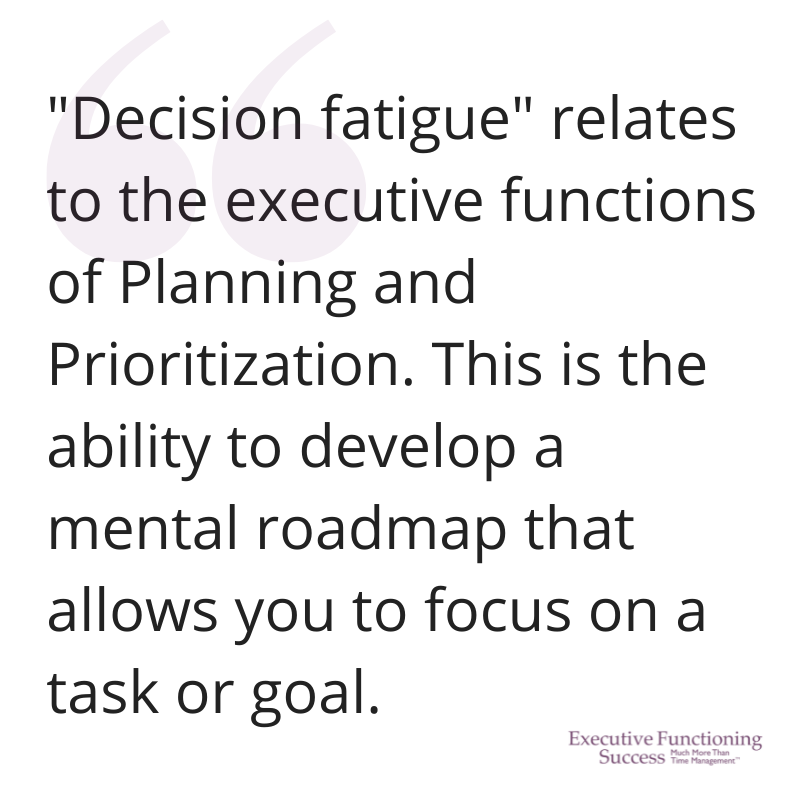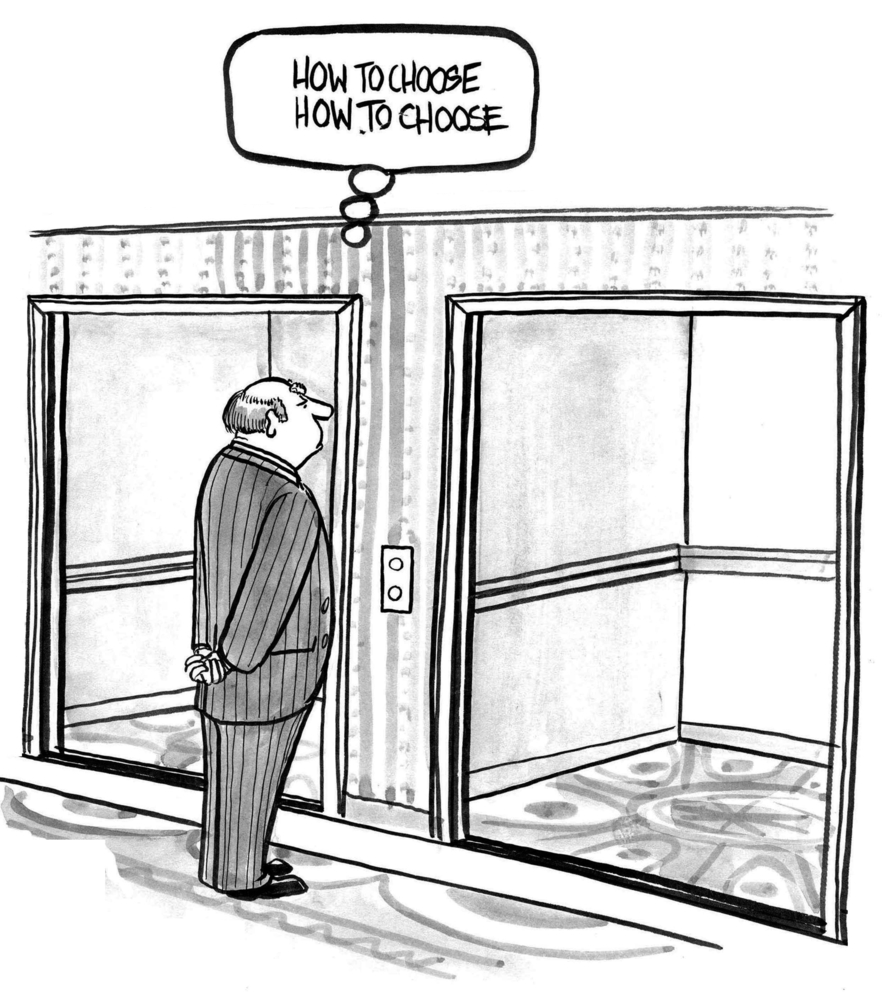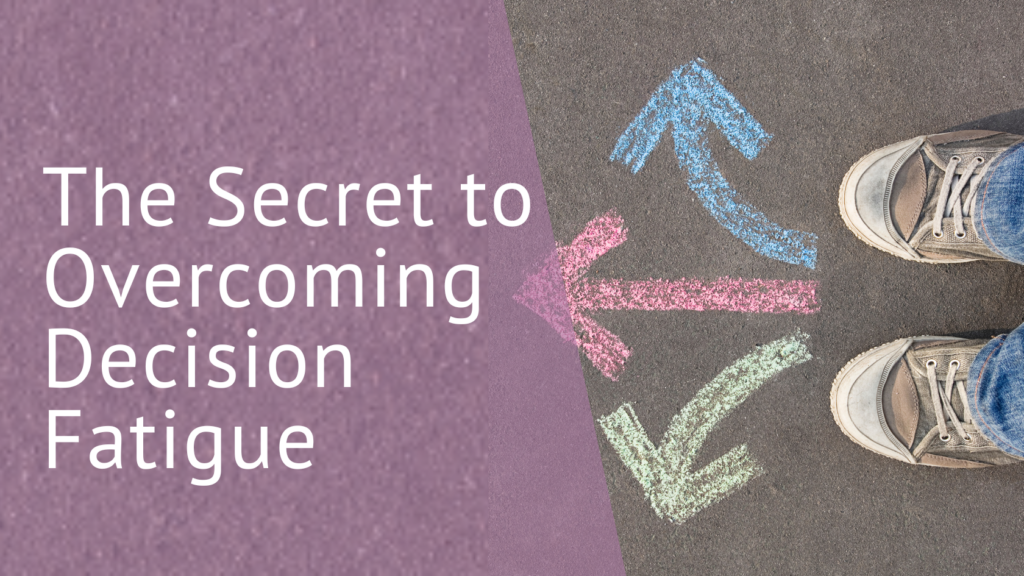Activating the executive functioning system of the brain requires constant effort and energy. Why?
Because we have to actively make choices throughout the day to prioritize tasks, sustain attention, manage distractions and muster the will to start or finish things we don’t want to do in the first place.
Sound familiar?
So many of my clients, often with ADHD, report feeling overwhelmed by everything they need to do. They either freeze or escape by wasting time doing easy things that are not on their to-do list.
There is a great descriptor for these feelings: decision fatigue. It is just too hard to decide what to do next!
Decision fatigue relates to the executive functions of Planning and Prioritization. These are the ability to develop a mental roadmap that allows you to focus on a task or goal. Not only do these executive functions help you to know what to do next, they also help you resist choices that do NOT support your goals. When faced with too many choices, those with poor planning and prioritization skills get stuck.
 Here’s a great example from a private Seeing My Time client session. This client had a rather unique decision to make every single morning when heading to work at a university. She has responsibilities in two different departments at two entirely different campus locations. As we were analyzing her challenges getting out the door on time, she said, “And I don’t know which office to go to. I worry about that choice every morning.”
Here’s a great example from a private Seeing My Time client session. This client had a rather unique decision to make every single morning when heading to work at a university. She has responsibilities in two different departments at two entirely different campus locations. As we were analyzing her challenges getting out the door on time, she said, “And I don’t know which office to go to. I worry about that choice every morning.”
This confused me until she explained that she has two different personal offices on campus! She was experiencing decision fatigue every morning, which contributed to feelings of stress and malaise.
This was an interesting challenge to solve, but she did, with a little help and a plan.
How to Alleviate Decision Fatigue
As a young mother, I myself struggled constantly with decision fatigue. I felt like I was going in circles all day, running myself ragged trying to simply do basic tasks.
One day, I finally stumbled upon a solution. And I have the laundry to thank for it!
For context, I just hated having laundry on my mind every day. It never went away. Just thinking about laundry was exhausting and used up valuable energy.
Can anyone relate??
So, I made one single decision that made my life so much easier: I decided to only do laundry on Fridays. This removed the need to make choices about laundry and freed up valuable brain space to focus on other things.

All these years later, I still don’t even think about laundry any other day of the week. I often put a load in the washer just after my morning shower, and move that load to the dryer and start the second load before I go to work. I get home and immediately fold that first load from the dryer, and put the next load in the dryer. The last thing I do before going to bed is fold the last load and put everything away. Done!
Routines Support the Brain
Why does this system work so well? I set up a routine. Making decisions requires activating the prefrontal cortex, which takes energy. Whereas a routine is a pattern of behavior that doesn’t require active decision-making. Routines are stored in a different region of the brain. As a result, they become automatic.
Other examples of my routines are being a clean kitchen cook, putting dirty cooking implements and such into the dishwasher as I use them. That makes cleaning up the kitchen after meals less daunting. I empty the dishwasher before I go to bed so I can be a clean kitchen cook the next day.
At work, the last thing I do every day is to fill out my day plan for tomorrow and tidy up the EFS office so it is organized and ready for clients. All of these patterns no longer require making a decision. I can do them mindlessly. This is such a relief for my brain.
My client now has a routine for which office to use. She chose one for Monday, Wednesday, and Friday and goes to the other one for Tuesday and Thursday. This helps her set up predictable open office hours for her students in each department. This also lowers her stress level.
Pause and think about which regular small decisions could be routine. Start with one or two. You can add more over time. Your brain will thank you.
Little by little…
Marydee

